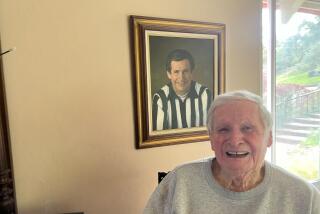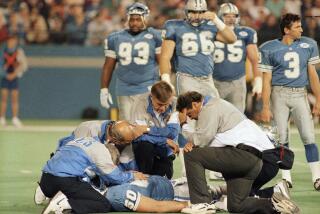Croudip’s Death Puts Sports Tragedies in Perspective
- Share via
Words such as tragedy and disaster tend to get misused on the sports pages, where reality is frequently twisted by a mistaken notion that games are of ultimate importance.
It is not, for example, a disaster to lose 23 games in a row, though the Baltimore Orioles’ start this season was at times described as just that.
Goal-line fumbles have been labeled disastrous. Are you kidding?
Disaster isn’t a game being lost after a star reliever is ejected. No, not even a playoff game.
Further, broken legs, torn rotator cuffs, fractured jaws and ripped ligaments are neither disastrous nor tragic. Unfortunate, certainly. But not disastrous or tragic.
Tragic is when a rather anonymous special teams player dies at the age of 29 . . . of any cause.
Tragic was the Monday morning death of David Croudip, a young man from San Diego State who had parlayed spirit, determination and toughness into a responsible and respected position as captain of the Atlanta Falcons’ special teams.
It is a shock whenever a person so young passes away, but this was even more shocking because laboratory tests indicated that David Croudip died because of an overdose of cocaine.
That was so shocking because this was a man who got to where he was only because he was able to get the maximum from body, soul and mind. Of all the seniors on the 1982 SDSU football team, Croudip figured to be among the least likely to stick in the National Football League.
Indeed, Croudip was hardly a celebrated and beribboned collegiate performer. He won no postseason honors, even within his own team. His one note of distinction in the media guide is that he shares the SDSU record for longest interception return, a 100-yard run against Cal State Long Beach.
Croudip’s most significant physical asset was speed, but he didn’t really have the speed to compensate for the fact that he was only 5-feet 7-inches and 180 pounds. Tall and swift would almost invariably beat out short and swift when it came time to trim rosters.
And yet there he was, 6 years later, earning a living in the NFL.
David Croudip may have been the quintessential overachiever.
Looking for some insight on how David Croudip had succeeded where seemingly greater talents had failed, I came upon an Oct. 21, 1984 story on the Rams’ special teams. David Croudip was a Ram then, and special enough to the special teams that the first two words in the story were . . .
“David Croudip . . . “
Later in the story, Gil Haskell, the Rams’ special teams coach, said: “Croudip is a great story. He can do everything except grow. He makes tackles, and you can’t block him. He’ll run right by those big guys, or around ‘em, without losing his stride, just like you’re playing tag in school.”
It seems that in a game at New Orleans, Croudip had run right by all the big guys and made the tackle on 3 of 5 kickoffs . . . all inside the Saint 20. He was the special teams player of the week for the second time in what was a young season, and he was to get a new suit from the team for each honor.
“My mother will be happy,” he said. “I can dress up now. She’s worried about me wearing a lot of jeans. She says, ‘Hey, dress up.’ ”
Indeed, David Croudip seemed to have this golly, gee whiz way about him.
“Flying to New Orleans,” he said, “maybe 10 minutes of that time I’m looking and thinking, ‘Wow, I’m here with the Rams.’ I’m having fun.”
If he had been having a personal battle with the demons of cocaine all this time, it was certainly not apparent to teammates or club officials . . . nor was it apparent to the Falcons.
Atlanta cornerback Scott Case refused to believe cocaine could have been involved.
“I can’t and won’t believe that,” he said. “I just don’t believe it. I practically lived with the guy every day.”
And it was obvious he loved the guy.
“He was always the most energetic and upbeat guy on the team,” Case said. “We voted him special teams captain. That’s a big honor. I can’t really explain the feeling when I heard about it (his death).”
Everyone in the Falcon organization seemed equally shocked, as if this was the last guy in the world anyone would have expected to be in any way involved with cocaine.
We don’t know, of course, if Croudip’s death was a final surrender after a long struggle with the drug or a circumstance in which the naive victim did not really understand the danger in what he was doing.
In either case, it seems incongruous that such a fellow would be involved with such an uncontrollable controlled substance.
The same qualities that enabled him to succeed in the NFL, mental toughness and concern for his health, would figure to have been the qualities that kept him away from such a destructive element.
It is just a shame those qualities had not reversed themselves. It is a shame that he had not been a loser in football . . . and a winner against drugs.
More to Read
Go beyond the scoreboard
Get the latest on L.A.'s teams in the daily Sports Report newsletter.
You may occasionally receive promotional content from the Los Angeles Times.










